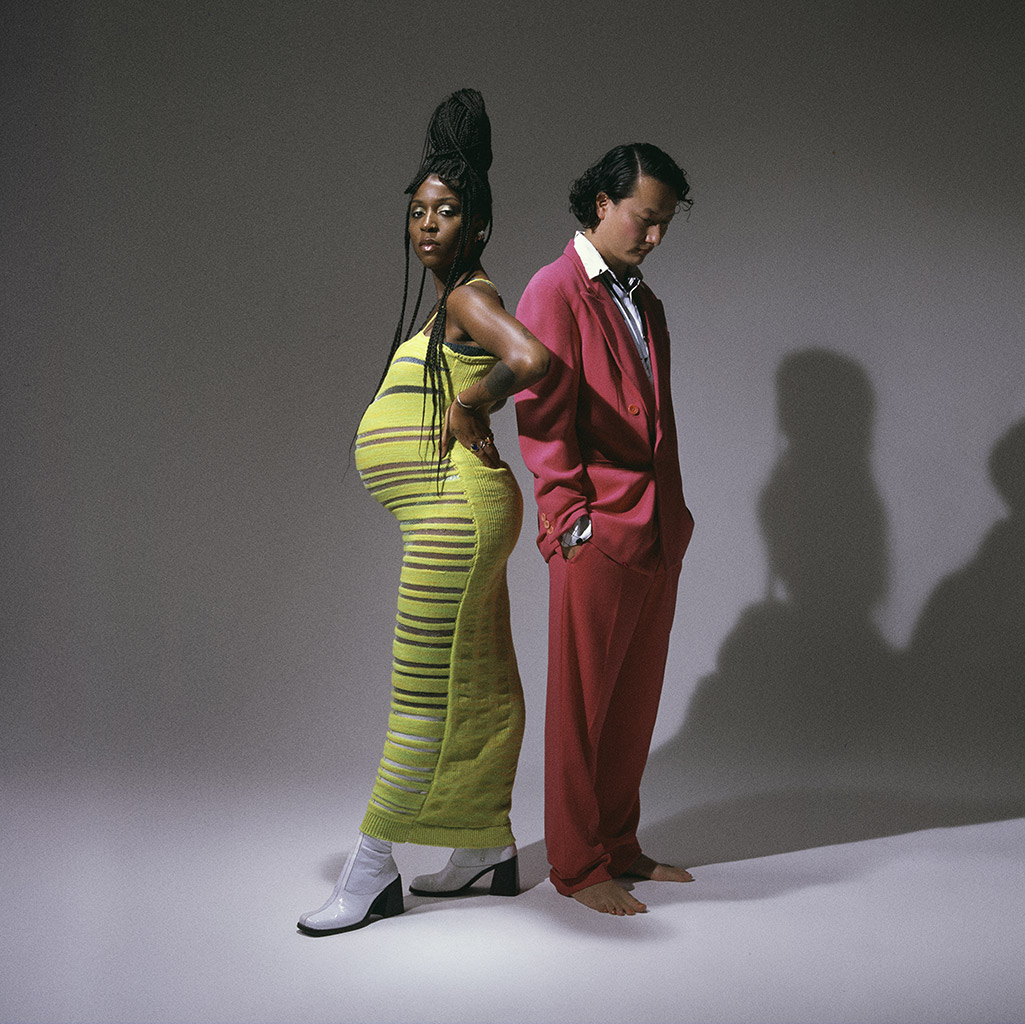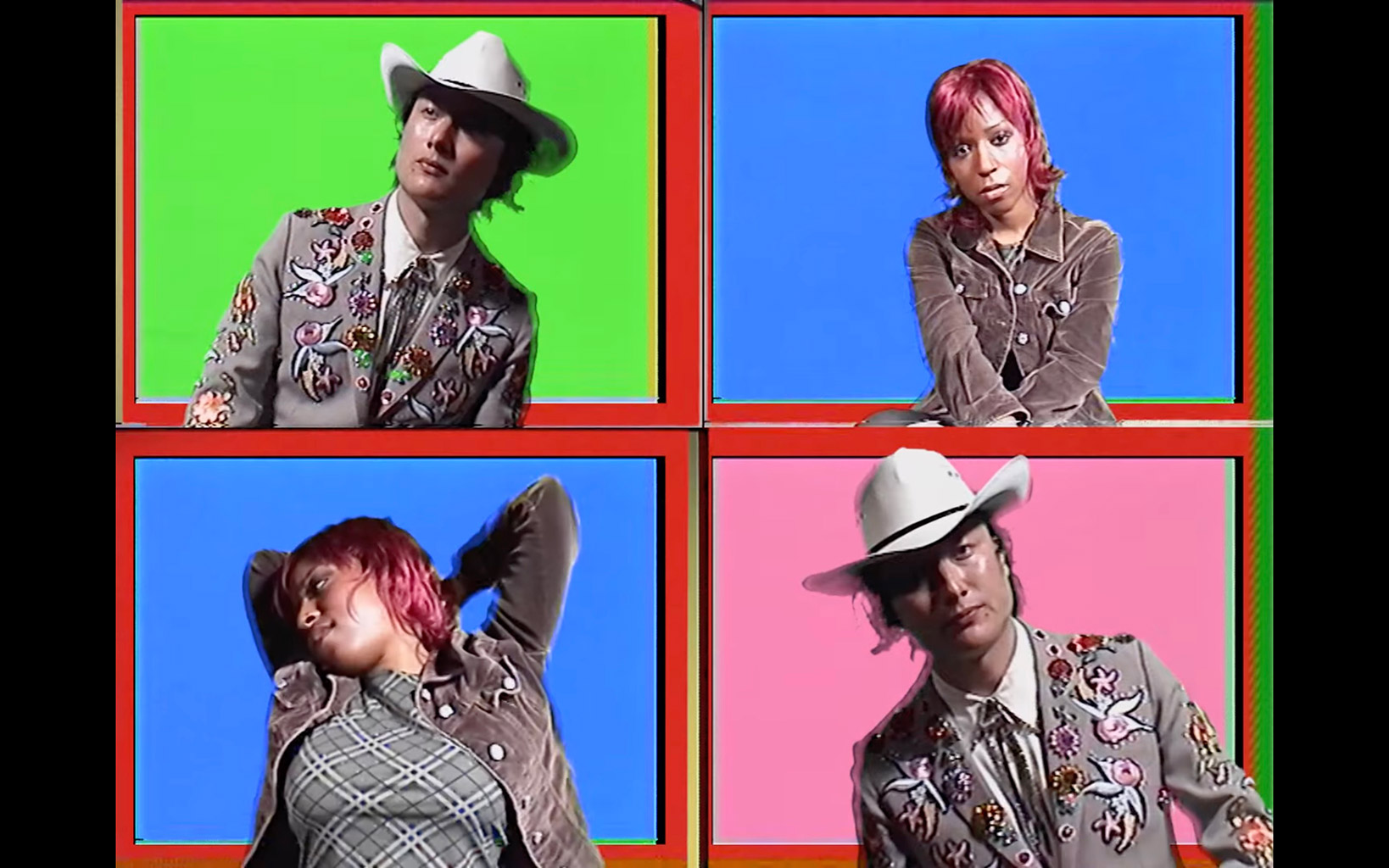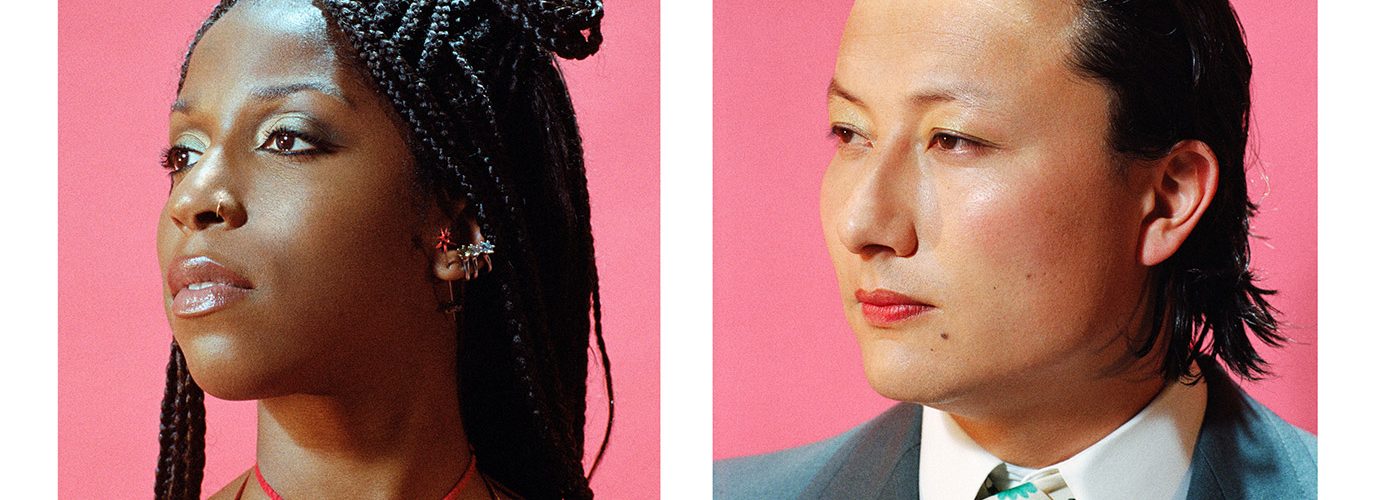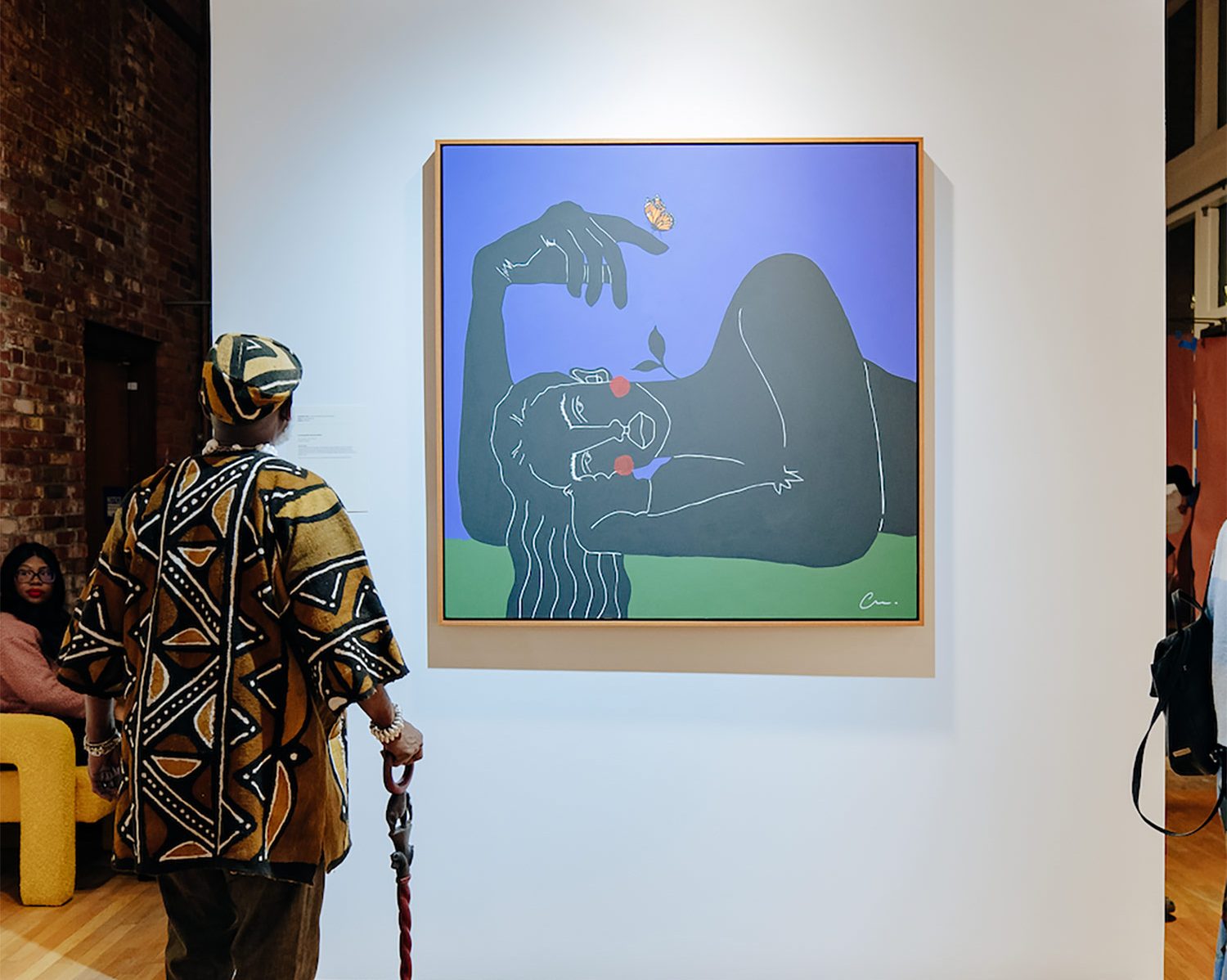

Photos by Camille Vivier
Can you tell me a bit about how the title for “Topical Dancer” came about? Why did you decide to focus on the topic of pop culture in the 2020s?
Charlotte Adigéry: The album was actually already finished before we started thinking of a name. The both of us were brainstorming at DEEWEE with Stephen and David Dewaele, and it kinda started as a joke to be honest. But then it made sense, I guess? It was a wordplay, but it kinda captures exactly what we wanted to portray with the record: a search of the balance between on one hand the cerebral, the topical, the conversational side and on the other hand the intuitive side, the dance aspect. What we tried to do on each song is finding that exact same balance. Between humour and seriousness; between different genres. We wanted to make something original, not bound by any boundaries.
Pop culture is a great medium and great work of art. It can address all types of people from any age and background. We are really inspired by pop and a lot of pop artists by David Bowie, Grace Jones, David Byrne… to us, they are great artists because they created a universal language that is layered, researched without being too cerebral and authentic. The great thing about pop art is that you get it in an instant, you can relate to it, you can define it easily — but it’s also not simplistic.
How do you find the balance between discussing serious issues such as misogyny, racism, colonialism, etc. while simultaneously finding the humor in it all? Is there a guiding philosophy or ethos?
Charlotte Adigéry: I think what we tried to do is propose a different point of view. These are topics that are often currently very “hot topics.” We are happy they are being discussed because it makes us feel represented. These topics, however, create a lot of polarization, and we try to maybe add some oxygen to these topics by not taking ourselves too seriously. To reference Mary Poppins: “A spoonful of sugar makes the medicine go down.” It’s not mocking; it’s not minimizing these subjects. It’s just our way of proposing to see it in another point of view.
As creators, you actively strive to deconstruct or work outside of the boxes that people might easily place you into. Thinking back on your creative and artistic careers, where do you think this sentiment or desire comes from? Is it particularly heightened when you all are working together, and if so, why do you suppose that is?
Charlotte Adigéry: Thank you for recognizing that! Our music is our place — albeit an abstract and fictional place, where we can be all of the things we are (which is very hybrid). We both found that wherever we are, we are not really accepted or seen as peers, so we just made a place where we can be all of these things. It’s an emancipating place where you can be Chinese and Belgian; be Caribbean and Belgian… and make it all make sense. We find strength in the elements that define us. Bolis really inspired me to explore; we kind of invite that in each other.
Bolis Pupul: Yes, and in my experience, it is the same when it comes down to making music and deciding what we want to make or what we don’t want to make. I think we feel uncomfortable whenever we tend to go into just one direction — let’s say a techno vibe — we immediately try to introduce something from another world, to take it out of it’s “comfort” zone; make it hybrid. There’s a kind of playfulness we like to keep when it comes down to genres.
So much of this record is about identity, and Charlotte, the press release quotes that you feel you are “a product of colonialism.” I’m wondering if you might expand upon this a little bit.
Charlotte Adigéry: My parents are French-Caribbean. It’s quite literal what I meant with that: the original inhabitants of Martinique were not black at all. My whole culture would not have existed if it wasn’t for colonialism. But now that I live in Belgium, I am again a product of colonialism; a lot of people from that Caribbean come to Europe (particularly France) to study or work.
I love the spoken dialogue in “Esperanto” and all the alternative methods of saying things that it presents. What was your process for choosing these specific examples? Any good ones that were left on the cutting room floor?
Charlotte Adigéry: I don’t think we left out any, but we just chose these topics because we felt they were maybe sort of the obvious ones — the current hot topics previously mentioned. Misogony, discrimination, sexism… The process was, weirdly enough, fun; it is a satirical approach. We don’t laugh with it, but more about the extent those conversations are currently reaching right now with political correctness. The intention is great, but right now, people are dictating how you should speak, but that’s not changing the way you think. It is a very black and white conversation — actually, it kind of kills every conversation. We don’t need to point fingers; we need nuance. We need conversations.
Bolis Pupul: The last thing we need to do is cancel conversations and sometimes, I feel like that’s what happens when someone makes a mistake.
“HAHA” reminds me of laugh therapy. Did creating a track centered around laughing create a mood-shift or have a therapeutic lift for you all?
Charlotte Adigéry: I’d love to try laugh therapy one day! The process of making “HAHA” was a bit strange. I found a recording of my laughter during lockdown, but I recorded it a long time ago. When I was studying music, I was exploring what I could do with my voice for a class, and back then, I thought it could be interesting to record laughter. I had completely forgotten about it until I stumbled across [it]. I don’t think there is any special or secret message behind that song in particular, but we kept the listener guessing even more by adding the line, “Guess you had to be there.” It’s like a weird, abstract thing we made. We plan on performing it live, so maybe it can have that laugh therapy effect. Not sure if I’ll make it to the end of the song without getting the full on giggles though.
Bolis Pupul: I’m really curious to try this one live. If you start laughing and giggling for real, that’s just fine; it’s all about expression, and it’s infectious!
What first sold me on you all was your music videos and their retro aesthetic. What about the tape and analog look appeals to you, and how did you come to develop it as a key part of your visual identity?
Charlotte Adigéry: Maybe it is contradictory but we like things to be as timeless as possible… which is a strange decision to then use a retro aesthetic I realize. But thinking about it, it maybe makes it less “now” — all of our visual references that inspired us are not really current or trending. If it already looks aged, it cannot age? Haha. We love simple things like black and white pictures, certain silhouettes; it frees us from the current social media type of filter.
Bolis Pupul: To me, there’s a balance between a vintage feel and a more contemporary touch. By shooting with analog cameras, there is a certain mystery that is being added to the image; it becomes more iconic because we recognise it from well-known references. At the same time, we don’t want to be too retro as that is something that can easily be a trick.


Along those lines, marketing oneself as a creative — whether in press releases or music videos — often involves addressing one’s identity. What is your relationship to marketing and social media, as it pertains to identity or how you have to present yourself to others in a concise way?
Charlotte Adigéry: Interesting question. It is hard. We both don’t really have that reflex of posting stuff, so it is something we have to really think of consciously. But we don’t want it to feel forced; we try to portray us in a way that is true to ourselves. It cannot feel like marketing to us because that puts us off. We acknowledge the value of social media, but we are not super active on it… I personally don’t like using my phone; I try to avoid spending too much time on it. So we try to find a middle ground where we can be authentic and post when we feel like it and keep it real.
You all obviously share a lot in the way of creative overlap and similar senses of humor, but I assume your different identities, cultures, and backgrounds still allow for you to learn from one another’s life experiences. What have you discovered about one another in the process of making Topical Dancer?
Bolis Pupul: It’s true, humor is a shared interest of [ours]; when we text each other, 9 out of 10 messages are jokes, and 1 will be like “what time do we meet in the studio tomorrow?”
But Charlotte introduced me to Zouk music on this record. I wasn’t really familiar with this genre, but it was something that really had an impact on me. One band in particular, Kassav’, was one I played a lot back when we were working on the record. I remember I wasn’t really feeling well — I had some heartaches — but I played this music for a period of time every morning when I was taking a shower; it uplifted my spirit each and every time!
Another thing I learned from our friendship is that we tend to be complementary at times. For example, I think I am more of an introvert while Charlotte is more of an extrovert. I would be very cautious while Charlotte can get me out of my comfort zone and let me do things I wouldn’t normally do. She would go out and talk to everyone while I would be very picky in who I would talk to. It’s a bit exaggerated how I put it now but there is some kind of dynamic between the two of us that feels like we can challenge each other in a constructive way.
What do you want viewers to take away from your record? Is there anything you’ve received in terms of feedback or reception that you’ve found particularly interesting or exciting?
Bolis Pupul: If people resonate to the lyrics, that’s a great compliment; we recently played a show in London where we had an audience with people from lots of different backgrounds and when we played our song, “Blenda” we saw that people understood what we were saying without needing to explain to them what we were doing. People nodding or singing along with words like. “Go back to the country where you belong,” and feeling like they also had heard that line before felt like a strong connection to me.
It would be nice if there could be a better understanding after listening to our music. Perhaps some songs can unwrap certain heavy topics we touched; conversations can start after hearing a specific track, and who knows, people will be more willing to listen to one another. But we would also be very happy if people could just dance their asses off on this record, because let’s not forget that dancing can free our minds!
Ω







[…] interviu pentru redefinemag.net, Charlotte și-a detaliat perspectiva asupra corectitudinii […]